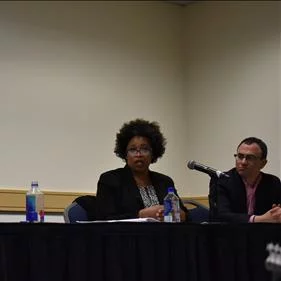‘And we go from there’

Operation Understanding D.C. is a non-profit organization that aims to teach African-American and Jewish students the leadership skills they need to work together to end racism, anti-Semitism and other forms of discrimination.
Yolanda Savage-Narva, Operation Understanding’s executive director, told the group’s origin story during a panel discussion at George Washington University on Feb. 27: “Our founder started the organization for a couple of reasons: Number one, because of the strong connections blacks and Jews had during the Civil Rights movement and, on the flip side, [because] she saw that there was a deterioration between the groups.”
Honoring that past tradition and how to keep the relationship going between blacks and Jews was the theme of “From Selma to Charlottesville: a panel on the legacy of black-Jewish relations in America,” held in GW’s Marvin Center as Black History month drew to a close.
The panel, hosted by GW Hillel, the GW Jewish Student Association, NAACP-GWU Chapter and other groups brought together black and Jewish students to learn about their shared history and to understand how different communities can support each other in times of hardship and peace.
Other speakers on the panel included the director of the Judaic Studies program and an associate professor in the History Department at GW, Professor Daniel Schwartz, as well as Ann Millin, a historian at the United States Holocaust Memorial Museum.
Millin offered background on black-Jewish relations during the post-World War II and Civil Rights eras, explaining that after escaping war torn Europe, many American Jews were horrified by the extent of the racism they saw in the United States. The refugee Jews who came to America “were shocked by what they saw and began to get very politically involved.”
Emmy Cohen, a recent graduate of American University and volunteer with Operation Understanding, stressed that “during the current historical moment, in which Jewish communities and Black communities are both being targeted by neo-Nazi and white supremacist groups, I think it is important to reflect on the history of the relationship between the two groups.”
“When I first started organizing this panel, my knowledge of black-Jewish relations was quite limited,” said Hillel Zand, a junior at GW and president of GW’s Hillel and Jewish Student Association. “After listening to the nuanced discussion between the panelists, I learned that the legacy of black-Jewish relations is so much more complex than I had originally made it out to be. As a community which is no stranger to discrimination, it is the Jewish community’s responsibility to use the privileges and resources we have at our own disposal today to help all marginalized communities.”
When asked to predict what they saw for the future of black-Jewish relations in the United States, all three panelists sounded a hopeful note. Savage-Narva pointed to the example of the work she does with OUDC, saying, “The organization brings black kids and Jewish kids together, and it’s not always Kumbaya and having a great time, I have to tell you. We have some difficult conversations about a lot of the issues that we’ve discussed here today.
“But I think starting the conversation and really having the courage to talk from your heart and work through things is where we actually start. And we go from there.”